|
|
|
Sort Order |
|
|
|
Items / Page
|
|
|
|
|
|
|
| Srl | Item |
| 1 |
ID:
164621
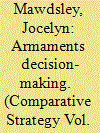

|
|
|
|
|
| Summary/Abstract |
When states make decisions on armaments policy, it is generally agreed they try to achieve combinations of foreign, security, industrial, economic, and technological policy goals alongside equipping their armed forces as efficiently as possible. It is, however, consistently argued in both the defense-economics and EU-studies literature that for European states things are (or should be) different. This article contributes to this debate by bringing together these disparate literatures to critically examine the proposition that the existence of a semi-regionalized European defense economy fundamentally changes state calculations on armaments policy. It critically examines the two main claims made about behavioral change: that European states accept a liberalized European defense market governed by the EU and make armaments decisions on a value-for-money basis, or that defense interdependence is so advanced that European states no longer need to consider their national interests because these are subsumed in the European interest. The article then considers an alternative perspective, that state behavior has not changed but is restricted by the existence of a European defense market that, intentionally or not, works to protect the interests of the biggest European arms-producing states.
|
|
|
|
|
|
|
|
|
|
|
|
|
|
|
|
| 2 |
ID:
152329
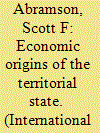

|
|
|
|
|
| Summary/Abstract |
This paper challenges the long-standing belief that changes in patterns of war and war making caused the emergence of large territorial states. Using new data describing the universe of European states between 1100 and 1790, I find that small political units continued to thrive well into the “age of the territorial state.” Some scholars have argued that changes in the production of violence led to the dominance of geographically large political units during this era. In contrast, I find evidence that variation in patterns of economic development and urban growth caused fragmented political authority in some places and the construction of geographically large territorial states in others. Exploiting random climatic deviations in the propensity of certain geographical areas to support large populations, I show via an instrumental-variables approach that the emergence of towns and cities caused the formation of small and independent states.
|
|
|
|
|
|
|
|
|
|
|
|
|
|
|
|
| 3 |
ID:
124930
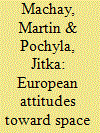

|
|
|
|
|
| Publication |
2013.
|
| Summary/Abstract |
A standard microeconomic tool is used to analyze quantitative data to reveal the attitudes of European states toward space exploration and exploitation. The contemporary economic crisis uncovers the real political priorities. The tool used helps us to distinguish between three policy types: activist, active, and passive. Words can radically differ from real actions of governments, as is shown in this article. Results indicate that there is a relatively strong core of supporting states of space exploration and exploitation in the middle of the European continent.
|
|
|
|
|
|
|
|
|
|
|
|
|
|
|
|
| 4 |
ID:
123885
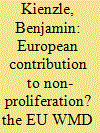

|
|
|
|
|
| Publication |
2013.
|
| Summary/Abstract |
In the aftermath of the ruptures caused by the Iraq crisis, European states agreed in December 2003 on both a European Security Strategy and an EU Strategy against the Proliferation of Weapons of Mass Destruction (WMD).
Ten years have passed since this attempt to kick-start common European policies on WMD proliferation. How well have EU policies performed in this area? Has a specifically European way of dealing with proliferation challenges emerged?
This article traces the development of EU policies on WMD proliferation since 2003 by examining, in particular, European reactions to the nuclear crisis in Iran, as well as European interactions with the international non-proliferation regime and the cooperation with partner countries. The article concludes that the EU has performed much better than might have been expected in an area that has traditionally been one of the fiercely guarded prerogatives of national security policies.
The EU's good performance is very much related to institutional flexibility, as exemplified by the EU/E3 approach to Iran, and to a high degree of political pragmatism. However, important shortcomings remain, most notably the lack of coordination between national and European non-proliferation efforts. In other words, the EU has not in the last 10 years turned into a fully fledged non-proliferation actor that can deliver tangible results in any area of proliferation concern.
|
|
|
|
|
|
|
|
|
|
|
|
|
|
|
|
| 5 |
ID:
119681


|
|
|
|
|
| Publication |
2012.
|
| Summary/Abstract |
Why have European states introduced mandatory integration requirements for citizenship and permanent residence? There are many studies comparing integration policy and examining the significance of what has been interpreted as a convergent and restrictive "civic turn," a "retreat from multiculturalism," and an "inevitable lightening of citizenship." None of these studies, however, has puzzled over the empirical diversity of integration policy design or presented systematic, comparative explanations for policy variation. This article is the first to develop an argument for what, in fact, amounts to a wealth of variation in civic integration policy (including scope, sequencing, and difficulty). Using a historical institutionalist approach, the author argues that states use mandatory integration to address different membership problems, which are shaped by both existing citizenship policy (whether it is inclusive or exclusive) and political pressure to change it (in other words, the politics of citizenship). She illustrates this argument by focusing on three case studies, applying the argument to a case of unchallenged restrictive retrenchment and continuity (Denmark), to a case of negotiated and thus moderated restriction (Germany), and to a case that recently exhibited both liberal continuity (the United Kingdom, 2001-6) and failed attempts at new restriction (the United Kingdom, 2006-10). These cases show that although states may converge around similar mandatory integration instruments, they may apply them for distinctly different reasons. As a result, new requirements augment rather than alter the major contours of national citizenship policy and the membership association it maintains.
|
|
|
|
|
|
|
|
|
|
|
|
|
|
|
|
| 6 |
ID:
105180
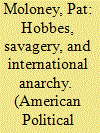

|
|
|
|
|
| Publication |
2011.
|
| Summary/Abstract |
This article argues that Hobbes constructed the sovereignty acknowledged among European states on the supposition of the absence of sovereignty in the New World. The notion of international anarchy found in Hobbes before the twentieth century was not the anarchy of interstate relations later posited by realism, but the anarchy of prepolitical societies outside the ordered system of European states. The modern geography of sovereignty that Hobbes established is demonstrated with reference to the cartographic traditions that informed his representation of the state of nature and the civil state, and to the historical context of the law of nations as it was understood to manage colonial rivalry in the seventeenth century. By constructing savages as absolutely free individuals in the state of nature, he precluded their recognition as free sovereign states. He thus contributed a set of premises to natural jurisprudence that denied indigenous societies statehood and excluded them from the family nations. A sketch of the Hobbesian legacy among theorists of the law of nations and international law is made, showing how his motif of savage anarchy remained central to our conceptualization of the sovereign state within the international realm into the twentieth century.
|
|
|
|
|
|
|
|
|
|
|
|
|
|
|
|
| 7 |
ID:
122370


|
|
|
|
|
| Publication |
2013.
|
| Summary/Abstract |
The experiment to federalize Europe, which many discussed in full seriousness in the 1990s, will be declared unsuccessful, and the European states will gradually shift over to other means of enhancing their viability in the restless and troubled world of the 21st century.
|
|
|
|
|
|
|
|
|
|
|
|
|
|
|
|
|
|
|
|
|